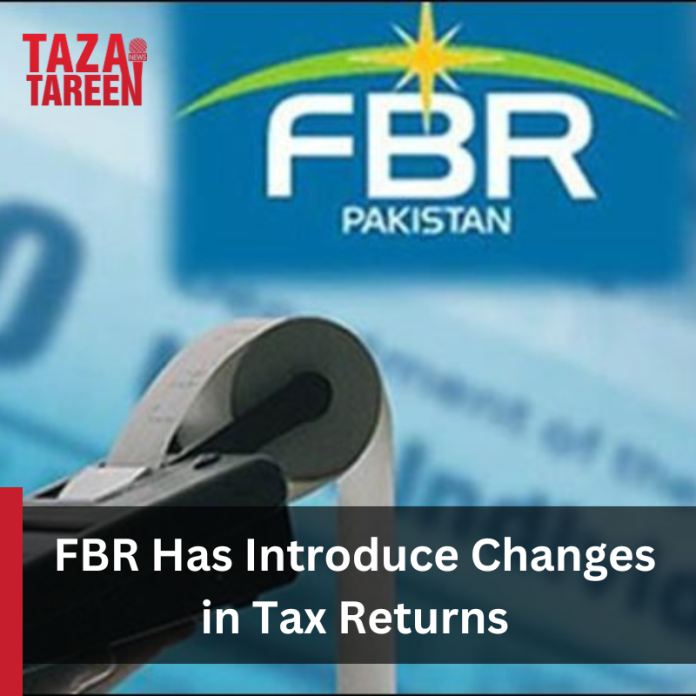If you’re filing your tax returns in Pakistan for 2025, you’ve probably already heard that FBR (Federal Board of Revenue) has introduced key changes in the income tax return forms. But what exactly has changed? How will it impact salaried individuals, business owners, and property holders? And most importantly, how can you avoid penalties while complying with the new rules?
This article unpacks the latest FBR tax return changes, explains their implications, and provides a practical step-by-step guide for taxpayers in Pakistan.
What Are the Major FBR Tax Return Changes in 2025?
Based on recent updates from Geo.tv, Dawn, and The Express Tribune, here are the headline changes:
-
Assets Declaration Without Formal Valuation
- Taxpayers can now declare assets without requiring costly valuations.
- This reduces compliance hurdles and encourages wider reporting.
-
Mandatory Property Value Declaration
- All taxpayers must declare property values when filing returns.
- Non-compliance could result in penalties or audits.
3. Clarified Income Tax Return Form
- FBR has revised and clarified categories in the 2025 form.
- Aims to make the filing process more user-friendly and transparent.
Why Did FBR Make These Changes?
According to FBR’s official stance:
-
Ease of Doing Business: By removing formal valuation requirements, they lower costs for taxpayers.
-
Widening the Tax Net: Pakistan has only ~4 million return filers in a country of 240+ million people. Simplified processes aim to increase compliance.
-
Transparency in Property Ownership: Real estate has long been a grey area for tax evasion. Mandatory property declaration is meant to plug loopholes.
Who Will Be Affected by These Tax Return Changes?
Salaried Individuals
- Simplified return forms reduce confusion when declaring allowances, savings, or investments.
Business Owners & Freelancers
- May benefit from easier asset declarations without valuations.
Property Owners
- Will face the biggest impact since property values must now be declared.
- Undervaluation may lead to legal and financial risks.
Filing Tax Returns with New Changes (2025)
1. Gather Documentation
-
CNIC copy
-
Salary slips or business income statements
-
Property ownership documents
-
Bank statements
2. Log in to IRIS Portal
-
Visit: iris.fbr.gov.pk
3. Declare Assets (New Rule)
-
Assets can now be entered without formal valuation certificates.
4. Declare Property Values
-
Accurately report market or FBR-notified property values.
-
Cross-check with official valuation tables.
5. Review Clarified Form Sections
-
New form is categorized for salaried, business, property, and other income.
6. Submit Before Deadline
-
Usual deadline: 30th September (check FBR notification for extensions).
Pros & Cons of FBR’s 2025 Tax Changes
| Pros | Cons |
|---|---|
| No need for costly asset valuation | Increased compliance burden for property owners |
| Clearer, simplified return form | Higher risk of penalties for undeclared property |
| Encourages wider tax net | Confusion among first-time filers |
| Reduces entry barriers for freelancers | Monitoring challenges for FBR |
-
FBR has simplified asset declaration (no valuation required).
-
Property values must be declared in 2025 returns.
-
Revised tax return form aims for clarity and compliance.
-
Non-compliance = risk of penalties and audits.
-
Beneficial for salaried individuals and freelancers, stricter for property owners.
FAQs:
1. What is the deadline for filing FBR tax returns in 2025?
The expected deadline is 30th September 2025, unless extended by FBR.
2. Do I need a property valuation certificate for my tax return?
No. FBR now allows declaring property without formal valuation.
3. What happens if I don’t declare my property values?
You may face penalties, audits, or exclusion from Active Taxpayer List (ATL).
4. How do salaried individuals benefit from these changes?
The new form is simplified, reducing confusion in declaring income and allowances.
5. Can freelancers and small business owners file more easily now?
Yes. By removing valuation requirements, FBR reduces compliance costs.
6. Is this part of IMF’s tax reform pressure?
Indirectly, yes. Pakistan’s tax reforms are aligned with IMF’s push for a wider tax net and transparency.


